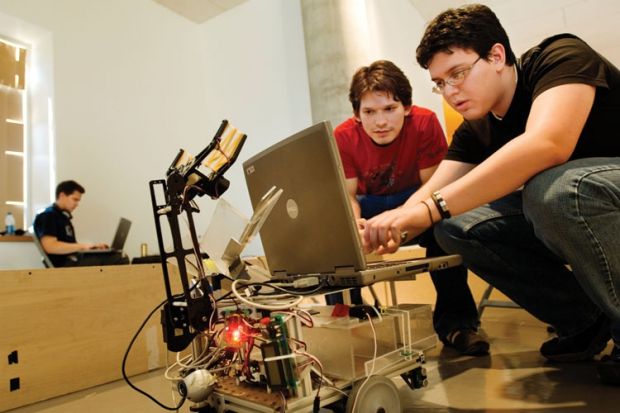Source: Alamy
What’s mine is not yours: some student entrepreneurs feel exploited
Universities are “out of date” and need to support, rather than exploit, new technologies, a debate on entrepreneurship heard last week.
Jessica Jones, a student at Cardiff University who has invented a fibre optic sensing technology, criticised university intellectual property agreements that she said did not sufficiently benefit inventors.
She explained that she had sought support outside the sector to fund her patent because the intellectual property agreement she was offered was “rigid” and “out of date”.
“They need to be dragged into the real world and realise their purpose. They’re there to support education and technology and I think they exploit it a lot of the time,” she told the event, held at the Royal Academy of Engineering on 20 September.
Other panellists at the event, titled “Why aren’t more young people pursuing entrepreneurial careers?” expressed concern that universities were keener to secure a stake in fledgling companies than nurture them.
Peter Brewin, founding director of innovative material firm Concrete Canvas and graduate of the Imperial College London and Royal College of Art master’s in industrial design engineering, said that although universities could be helpful in allowing access to equipment and office space, taking too large a stake in a company, especially when not directly investing in it, risked “killing” the idea.
Rather than act like venture capitalists, universities should support new companies as part of their role as public institutions, he said. “A university is about creating knowledge that can be used by everyone. One way of doing that is to write up papers and publish them, another is to launch a company.”
Ian Shott, chair of the RAE Enterprise Committee, added that the UK’s “plethora” of technology transfer offices was fragmented, with many based in universities that were too small to justify their cost, and each with “very prescriptive processes” run by inexperienced people.
Susannah Clarke, RAE Enterprise Fellow and research associate at Imperial College London, stressed the need for good advice from people outside academia. The co-founder of surgical device company Embody Orthopaedic said that real-life start-up experience was important “so that when they say to you, we’re the experts…you actually think that it might be true”.
Research shows that just 9 per cent of small business owners are under the age of 35. The panel was asked how better to support young entrepreneurs. Ideas included teaching intellectual property modules on technical courses, changing the way entrepreneurs are counted within university employment league tables and funding graduates through the difficult first year of company development.
Register to continue
Why register?
- Registration is free and only takes a moment
- Once registered, you can read 3 articles a month
- Sign up for our newsletter
Subscribe
Or subscribe for unlimited access to:
- Unlimited access to news, views, insights & reviews
- Digital editions
- Digital access to THE’s university and college rankings analysis
Already registered or a current subscriber? Login





